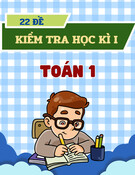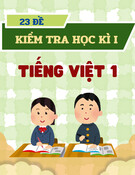
S GIÁO D C VÀ ĐÀO T O H I PHÒNGỞ Ụ Ạ Ả Đ THI TH T T NGHI P THPT NĂM Ề Ử Ố Ệ
2018
TR NG THPT TOÀN TH NG Năm h c 2017-2018 - ƯỜ Ắ ọ Môn : Ti ng Anhế
***** Th i gian làm bài 60 phút, không k th i gian ờ ể ờ
phát đề
Đ s : 01/ TT ề ố
Mark the letter A, B, C, or D on your answer sheet to indicate the word whose underlined part
differs
from
the other three in pronunciation in each of the following questions.
Question 1 : A. educate B. engineer C. acceptable D. department
Question 2 : A. future B. picture C. culture D. turn
Mark the letter A, B, C, or D on your answer sheet to indicate the word that differs from the other three
in
the position of primary stress in each of the following questions.
Question 3 : A. habitat B. inflation C. disease D. remove
Question 4 : A. complete B. command C. common D. community
Mark the letter A, B, C, or D on your answer sheet to indicate the underlined part that needs
correction
in
each of the following questions.
Question 5 :
They asked me how long did it take to get to Paris by train.
A B C D
Question 6 : After driving for twenty miles, he suddenly realized that he has been driving
A B C
in the wrong direction.
D
Question 7: Because the Red Cross accepts blood from most donors, the nurses will not let you
A B
give blood if you have just had a cold.
C D
Mark the letter A, B, C, or D on your answer sheet to indicate the correct answer to each
of the following questions.
Question 8 : In Vietnam, application forms for the National Entrance Examinations must be ___before
the deadline, often in April.
A. issued B. signed C. filed D. submitted
Question 9 : He walked ____ I could not catch up with him.
A. fast B. so fast that C. as fast as D. faster than
Question 10 : It is high time we _____ something to protect our environment .
A. do B. to do C. did D. have done
Question 11 : The more _____ you are, the easier it is for you to make friends.
A. reserved B. funny C. sociable D. social
Question 12 : I can ........... with most things but I cannot stand noisy children.
A. put up B. put on C. put aside D. put off
Question 13: Neither the students nor their lecturer .......... English in the classroom.
A. use B. are using C. uses D. have used
Question 14: ________ she can buy everything she likes.
A. So rich is she that B So rich she is that C. Such rich is she that D. All are right
Question 15 : This is the second time____________.
A. you are losing your door key B. you've lost your door key
1

C. you were losing your door key D. your door key was lost by you
Question 16 : The man ______ is very friendly.
A. that lives next door B. who live next door
C. which lives next door D. who lives the next door
Question 17: Universities send letters of .......... to successful candidates by post.
A. accept B. acceptable C. acceptably D. acceptance
Question 18 : If you do not learn seriously, ________ to understand the subject well.
A. you will never be able B. will you never be able
C. never you will be able D. will never you be able
Question 19 : His research has not been able to be .............. because of a financial difficulty.
A. set up B. put off C. turned on D. carried out
Mark the letter A, B, C, or D on your answer sheet to indicate the most suitable response to
complete each of the following exchanges.
Question 20: - Tim : “ Let’s go to Fuji for our summer holiday ! “
- Tom : “ _______ “.
A. How about you ? B. What’s the matter C. Not at all D. OK. It sounds good
Question 21: - Lora : “ Sorry, the manager is not here “
- Jane : “ _______ ? “.
A. Can I take a message then B. Can I speak to the manager, please
C. Would you like to leave a message D. Can I leave a message then.
Mark the letter A, B, C, or D on your answer sheet to indicate the word(s) CLOSEST in meaning to
the underlined word(s) in each of the following questions.
Question 22: He’s really delighted with his success.
A. pleased B. angry C. entertained D. annoyed
Question 23: Try to eliminate fatty foods from your diet.
A. limit B. move C. add D. get rid of
Mark the letter A, B, C, or D on your answer sheet to indicate the word(s) OPPOSITE in meaning
to the underlined word(s) in each of the following questions.
Question 24: Those clothes are inappropriate for this morning.
A. improper B. attractive C. suitable D.available
Question 25: She is a very generous woman. She has given most of her wealth to a charity
organization.
A. mean B. amicable C. kind D. hospitable
Mark the letter A, B, C, or D on your answer sheet to indicate the sentence that is closest in
meaning to each of the following questions.
Question 26: People say that he gets a high salary.
A. It is said that he gets a high salary.
B. It is said for him to get high salary.
C. He is said that he gets a high salary.
D. That he gets a high salary is said.
Question 27 : It’s high time you started revising for the coming exam.
A. I think you should start revising for the coming exam right now.
B. Revising for the coming exam takes your time.
C. It’s time to come to the exam after revising.
D. The time is high because you started revising for the coming exam.
Question 28 : This film is interesting but the film we saw last week was more interesting.
A. The film we saw last week was as interesting as this one.
B. The film we saw last week was less interesting than this one.
2

C. The film we saw last week was more interesting as this one.
D. The film we saw last week was more interesting than this one.
Mark the letter A, B, C, or D on your answer sheet to indicate the sentence that best combines each
pair of sentences in the following questions.
Question 29: The weather was very hot. They continued playing football.
A. Although the hot weather, they continued playing football.
B. In spite of the hot weather, they continued playing football.
C. In spite of the weather was hot, they continued playing football.
D. Despite the weather was hot, they continued playing football.
Question 30: She helped us a lot with our project. We couldn’t continue without her.
A. Provided her contribution wouldn’t come, we couldn’t have continued with the project.
B. Unless we had her contribution, we couldn’t have continued with the project.
C. If she hadn’t contributed positively, we couldn’t have continued with the project.
D. But for her contribution, we could have continued with the project.
Read the following passage and mark the letter A, B, C, or D on your answer sheet to indicate the correct
word or phrase that best fits each of the numbered blanks from 31 to 35.
Singapore has a highly developed market-based economy, (31 ) ___ historically revolves around
extended trade. Along with Hong Kong, South Korea and Taiwan, Singapore is one (32 ) ___ The Four
Asian Tigers. The economy depends heavily on exports , refining, imported goods, especially in
manufacturing. Manufacturing constituted 26 (33)____ of Singapore’s GDP in 2005. The manufacturing
industry is well-diversified into electronics, petroleum refining, chemicals, (34)___ engineering and
biomedical sciences manufacturing. In 2006, Singapore produced about 10 percent of the world’s foundry
water output. Singapore is the busiest port in the world in terms of tonnage shipped. Singapore is the
world’s fourth largest foreign exchange trading centre after London, New York City (35 )_____ Tokyo.
Question 31 : A. who B. whom C. why D. which
Question 32 : A. of B. in C. for D. at
Question 33 : A. percentage B. persuasion C. perception D. percent
Question 34 : A. machine B. mechanical C. mechanically D. mechanic
Question 35 : A. and B. but C. or D. so
Read the following passage and mark the letter A, B, C, or D on your answer sheet to indicate the correct
answer
to each of the questions from 36 to 42.
American movies create myths about college life in the United States. These stories are entertaining,
but they are not true. You have to look beyond Hollywood movies to understand what college is really
like.
Thanks to the movies, many people believe that college students party and socialize more than they
study. Movies almost never show students working hard in class or in the library. Instead, movies show
them eating, talking, hanging out, or dancing to loud music at wild parties. While it is true that American
students have the freedom to participate in activities, they also have academic responsibilities. In order
to succeed, they have to attend classes and study hard.
Another movie myth is that athletics is the only important extracurricular activity. In fact, there is a
wide variety of nonacademic activities on campus such as special clubs, service organizations, art, and
theater programs. This variety allows students to choose what interests them. Even more important, after
graduation, students’ résumés look better to employers if they list a few extracurricular activities.
Most students in the movies can easily afford higher education. If only this were true! While it is true
that some American college students are wealthy, most are from families with moderate incomes. Up to
80% of them get some type of financial aid. Students from middle and lower-income families often work
part-time throughout their college years. There is one thing that many college students have in common,
3

but it is not something you will see in the movies. They have parents who think higher education is a
priority, a necessary and important part of their children's lives.
Movies about college life usually have characters that are extreme in some way: super athletic, super
intelligent, super wealthy, super glamorous, etc. Movies use these stereotypes, along with other myths of
romance and adventure because audiences like going to movies that include these elements. Of course,
real college students are not like movie characters at all.
So the next time you want a taste of the college experience, do not go to the movies. Look at some
college websites or brochures instead. Take a walk around your local college campus. Visit a few classes.
True, you may not be able to see the same people or exciting action you will see in the movies, but you
can be sure that there are plenty of academic adventures going on all around you !
Question 36: The stories about college life in American movies are not ____.
A. true B. interesting C. boring D. exciting
Question 37: The phrase “academic responsibilities” in the second paragraph is closest in meaning to
“______”.
A. learning duties B. training skills C. caring professions D. teaching methods
Question 38: Which of the following is NOT true?
A. Learning is only part of students’ college life.
B. There is a wide choice of extracurricular activities for college students.
C. Extracurricular activities are of no importance to employers.
D. Not all extracurricular activities are students’ academic responsibilities.
Question 39: The word “they” in the third paragraph refers to ______.
A. employers B. activities C. colleges D. résumés
Question 40: The word “moderate” in the fourth paragraph is closest in meaning to “______”.
A. not high B. unlimited C. not steady D. sensible
Question 41: Many American students have to work part-time throughout their college years because
______.
A. they are not allowed to work full-time B. they want to gain experience
C. their parents force them to D. they can earn money for their expenses
Question 42: Which of the following could best serve as the title of the passage?
A. Going to College: The Only Way to Succeed in Life
B. Hollywood Movies: The Best About College Life
C. Extracurricular Activities and Job Opportunities
D. American College Life and the Movies
Read the following passage and mark the letter A, B, C, or D on your answer sheet to indicate the
correct answer to each of the questions from 43 to 50.
The need for a surgical operation, especially an emergency operation, almost always comes as a
severe shock to the patient and his family. Despite modern advances, most people still have an irrational
fear of hospitals and anaesthetics. Patients do not often believe they really need surgery- cutting into a
part of the body as opposed to treatment with drugs.
In the early year of the 20th century, there was little specialization in surgery. A good surgeon was
capable of performing almost every operation that had been advised up to that time. Today the situation is
different. Operations are now being carried out that were not even dreamed of fifty years ago. The heart
can be safely opened and its valves repaired. Clogged blood vessels can be clean out, and broken ones
mended and replaced. A lung, the whole stomach, or even part of the brain can be removed and still
permit the patient to live a comfortable and satisfactory life. However, not every surgeon wants to, or is
qualified to carry out every type of modern operation.
The scope of surgery has increase remarkably in the past decades. Its safety has increased, too.
Deaths from most operations are about 20% of what they were in 1910 and surgery has been extended in
4

many directions, for example, to certain types of birth defects in new born babies, and at the other end of
the scale, to life-saving operation for the octogenarian. The hospital stay after surgery has been
shortened to as little as a week for most major operations. Most patients are out of bed on the day after an
operation and may be back at work in two or three weeks.
One of the most revolutionary areas of modern surgery is that of organ transplants. Until a few
decades ago, no person, except an identical twins, was able to accept into his body the tissues of another
person without reacting against them and eventually killing them. Recently, however, it has been
discovered that with the use of X-rays and special drugs, it is possible to graft tissues from one person to
another which will survive for periods of a year or more. Kidneys have been successfully transplanted
between non-identical twins. Heart and lung transplants have also been reasonably successful.
“Spare parts” surgery, the simple routine replacement of all worn-out organs by new ones, is still a dream
of the future but surgery is ready for such miracles. In the meantime, you can be happy if the doctors say
to you: “Yes, I think it is possible to operate on you for this condition.”
Question 43. Most people are afraid of being operated on _______.
A. in spite of improvements in modern surgery
B. because they think modern drugs are dangerous
C. because they do not believe they need anesthetics
D. unless it is an emergency operation
Question 44. Surgeons in the early 20th century compared with modern ones _____ .
A. had less to learn about surgery B. needed more knowledge
C. were more trusted by their patients D. could perform every operation known today
Question 45. A patient can still live a comfortable life even after the removal of _____.
A. his brain
B. a major organ such as the stomach or one lung
C. his lungs
D. part of the stomach or the whole liver
Question 46. The word “clogged” is most likely to correspond to _____.
A. clean B. blocked C. covered D. unwashed
Question 47. Today, compared with 1910 _________.
A. 20% fewer of all operation patients die
B. 20% of all operation patients recover
C. operation deaths have increased by 20%
D. five times fewer patients die after being operated on
Question 48. What is the similar meaning to the word “octogenarian ” ?
A. eighteen-year-old B. person in his eighties
C. person having eighth operation D. eye specialist
Question 49. The main difficulty with organ transplants is _____.
A. it is difficult to find organs of the same size
B. only identical twins can give permission for their organs to be exchanged
C. the body’s tendency to reject alien tissues
D. the patient is not allowed to use drugs after them
Question 50. You can be happy if your surgeon can operate because it means ______.
A. he thinks your condition may be curable B. he is a good doctor
C. he knows you will survive D. you are getting better already.
5

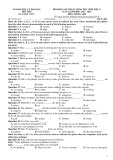
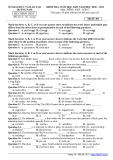

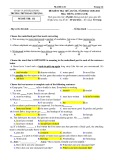

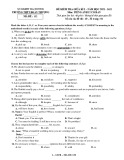
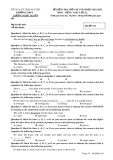
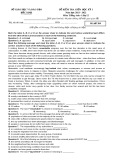


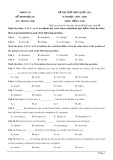






![Đề Thi Thử THPT Quốc Gia Môn Tiếng Anh 2019-2020 (Có Đáp Án) - [Chuẩn Nhất]](https://cdn.tailieu.vn/images/document/thumbnail/2021/20210224/nat_qb73/135x160/3961614122123.jpg)







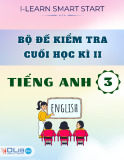
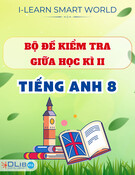
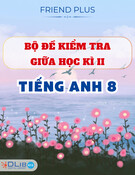
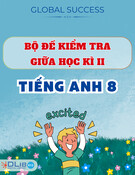
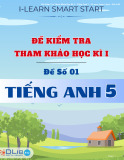

![Đề thi Tiếng Anh có đáp án [kèm lời giải chi tiết]](https://cdn.tailieu.vn/images/document/thumbnail/2025/20250810/duykpmg/135x160/64731754886819.jpg)
